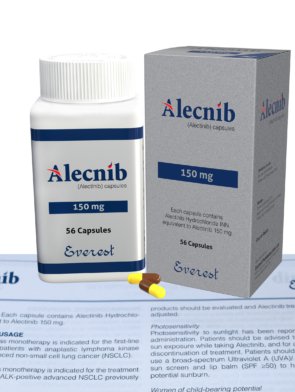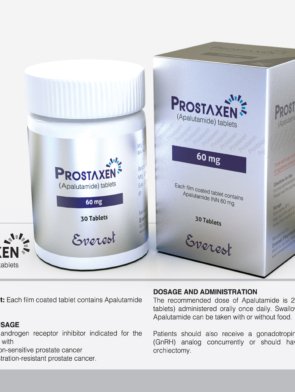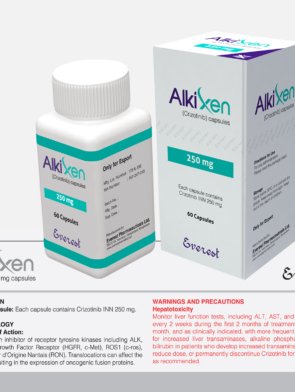Osicent(Osimertinib) 80Mg
£0.00
Osimertinib is kinase inhibitor of the epidermal growth factor receptor (EGFR), which binds irreversibly to certain mutant forms of EGFR (T790M, L858R, and exon 19 deletion) at approximately 9-fold lower concentrations than wild-type. In cultured cells and animal tumor implantation models, osimertinib exhibited anti-tumor activity against non-small cell lung cancer (NSCLC) lines harboring EGFR-mutations (T790M/L858R, L858R, T790M/exon 19 deletion, and exon 19 deletion) and, to a lesser extent, wild-type EGFR amplifications.
Indications
Osimertinib is a kinase inhibitor indicated for the treatment of patients with metastatic epidermal growth factor receptor (EGFR) T790M mutation-positive non-small cell lung cancer (NSCLC), as detected by an FDA-approved test, who have progressed on or after EGFR tyrosine kinase inhibitor therapy.
Dosage & Administration
80 mg orally once daily, with or without food.
Side Effects
The most common (>20%) adverse reactions (all grades) observed in Osimertinib-treated patients were diarrhea (42%), rash (41%), dry skin (31%), and nail toxicity (25%). The most frequent adverse reactions that led to dose reductions or interruptions were: electrocardiogram QTc prolonged (2.2%) and neutropenia (1.9%). Serious adverse reactions reported in 2% or more patients were pneumonia and pulmonary embolus.
Precautions
Interstitial Lung Disease (ILD)/Pneumonitis: Occurred in 3.3% of patients. Osimertinib should be permanently discontinued in patients diagnosed with ILD/Pneumonitis.
QTc Interval Prolongation: Electrocardiograms and electrolytes should be monitored in patients who have a history or predisposition for QTc prolongation, or those who are taking medications that are known to prolong the QTc interval. Osimertinib should be withheld then restarted at a reduced dose or permanently discontinued.
Cardiomyopathy: Occurred in 1.4% of patients. Left ventricular ejection fraction (LVEF) should be assessed before treatment and then every 3 months thereafter.
Embryo-Fetal Toxicity: Osimertinib can cause fetal harm. Females should be advised of potential risk to the fetus and to use effective contraception during treatment with Osimertinib and for 6 weeks after final dose. Males should be advised to use effective contraception for 4 months, after the last dose of Osimertinib.
Use in Pregnancy & Lactation
Based on its mechanism of action and animal data, Osimertinib can cause fetal harm when administered to a pregnant woman. There are no available data on Osimertinib use in pregnant women. Pregnant women should be advised of the potential risk to a fetus.
There are no data on the presence of Osimertinib in human milk, the effects of Osimertinib on the breastfed infant or on milk production. Lactating woman should be advised not to breastfeed during treatment.
Pediatric Use
The safety and effectiveness of Osimertinib in pediatric patients have not been established.
Geriatric Use
No overall differences in safety were observed between patients 65 years and older and those younger than 65 years.
Drug Interaction
Strong CYP3A Inhibitors
Concomitant administration of Osimertinib should be avoided with strong CYP3A inhibitors, including macrolide antibiotics (e.g., telithromycin), antifungals (e.g., itraconazole), antivirals (e.g., ritonavir), nefazodone, as concomitant use of strong CYP3A inhibitors may increase Osimertinib plasma concentrations. If no other alternative exists, patients should be monitored more closely for adverse reactions.
Strong CYP3A Inducers
Concomitant administration of Osimertinib should be avoided with strong CYP3A inducers (e.g., phenytoin, rifampicin, carbamazepine, St. John’s Wort) as strong CYP3A inducers may decrease Osimertinib plasma concentrations.
Commercial Pack
Osicent 80 Container Pack: Each bottles contains 30 tablets.
Osicent 80: Each box contains 1 blister strip of 10 tablets.
You must be logged in to post a review.





Reviews
There are no reviews yet.